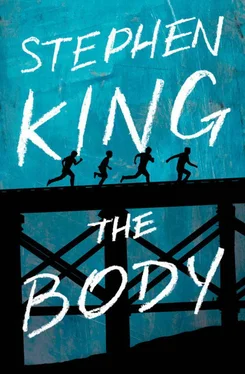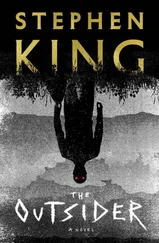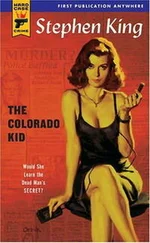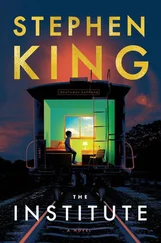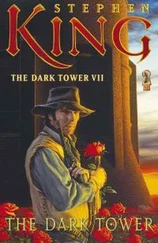We all said we wouldn’t tell, and a glum silence fell over us again. It was only quarter to three, but it felt much later. It was too hot and too much had happened. We weren’t even over into Harlow yet. We were going to have to pick them up and lay them down if we were going to make some real miles before dark.
We passed the railroad junction and a signal on a tall, rusty pole and all of us paused to chuck cinders at the steel flag on top, but nobody hit it. And around three-thirty we came to the Castle River and the GS&WM trestle which crossed it.
The river was better than a hundred yards across at that point in 1960; I’ve been back to look at it since then, and found it had narrowed up quite a bit during the years between. They’re always fooling with the river, trying to make it work better for the mills, and they’ve put in so many dams that it’s pretty well tamed. But in those days there were only three dams on the whole length of the river as it ran across New Hampshire and half of Maine. The Castle was still almost free back then, and every third spring it would overflow its banks and cover Route 136 in either Harlow or Danvers Junction or both.
Now, at the end of the driest summer western Maine had seen since the depression, it was still broad. From where we stood on the Castle Rock side, the bulking forest on the Harlow side looked like a different country altogether. The pines and spruces over there were bluish in the heat-haze of the afternoon. The rails went across the water fifty feet up, supported by an underpinning of tarred wooden support posts and crisscrossing beams. The water was so shallow you could look down and see the tops of the cement plugs which had been planted ten feet deep in the riverbed to hold up the trestle.
The trestle itself was pretty chintzy—the rails ran over a long, narrow wooden platform of six-by-fours. There was a four-inch gap between each pair of these beams where you could look all the way down into the water. On the sides, there was no more than eighteen inches between the rail and the edge of the trestle. If a train came, it was maybe enough room to avoid getting plastered… but the wind generated by a highballing freight would surely sweep you off to fall to a certain death against the rocks just below the surface of the shallow running water.
Looking at the trestle, we all felt fear start to crawl around in our bellies… and mixing uneasily with the fear was the excitement of a boss dare, a really big one, something you could brag on for weeks after you got home… if you got home. That queer light was creeping back into Teddy’s eyes and I thought he wasn’t seeing the GS&WM train trestle at all but a long sandy beach, a thousand LSTs aground in the foaming waves, ten thousand GIs charging up the sand, combat boots digging. They were leaping rolls of barbed wire! Tossing grenades at pillboxes! Overrunning machine-gun nests!
We were standing beside the tracks where the cinders sloped away toward the river’s cut—the place where the embankment stopped and the trestle began. Looking down, I could see where the slope started to get steep. The cinders gave way to scraggly, tough-looking bushes and slabs of gray rock. Further down there were a few stunted firs with exposed roots writhing their way out of fissures in the plates of rock; they seemed to be looking down at their own miserable reflections in the running water.
At this point, the Castle River actually looked fairly clean; at Castle Rock it was just entering Maine’s textile-mill belt. But there were no fish jumping out there, although the river was clear enough to see bottom—you had to go another ten miles upstream and toward New Hampshire before you could see any fish in the Castle. There were no fish, and along the edges of the river you could see dirty collars of foam around some of the rocks—the foam was the color of old ivory. The river’s smell was not particularly pleasant, either; it smelled like a laundry hamper full of mildewy towels. Dragonflies stitched at the surface of the water and laid their eggs with impunity. There were no trout to eat them. Hell, there weren’t even any shiners.
“Man,” Chris said softly.
“Come on,” Teddy said in that brisk, arrogant way. “Let’s go.” He was already edging his way out, walking on the six-by-fours between the shining rails.
“Say,” Vern said uneasily, “any of you guys know when the next train’s due?”
We all shrugged.
I said: “There’s the Route 136 bridge…”
“Hey, come on, gimme a break!” Teddy cried. “That means walkin five miles down the river on this side and then five miles back up on the other side… it’ll take us until dark! If we use the trestle, we can get to the same place in ten minutes !”
“But if a train comes, there’s nowheres to go,” Vern said. He wasn’t looking at Teddy. He was looking down at the fast, bland river.
“Fuck there isn’t!” Teddy said indignantly. He swung over the edge and held one of the wooden supports between the rails. He hadn’t gone out very far—his sneakers were almost touching the ground—but the thought of doing that same thing above the middle of the river with a fifty-foot drop beneath and a train bellowing by just over my head, a train that would probably be dropping some nice hot sparks into my hair and down the back of my neck… none of that actually made me feel like Queen for a Day.
“See how easy it is?” Teddy said. He dropped to the embankment, dusted his hands, and climbed back up beside us.
“You tellin me you’re gonna hang on that way if it’s a two-hundred-car freight?” Chris asked. “Just sorta hang there by your hands for five or ten minutes?”
“You chicken?” Teddy shouted.
“No, just askin what you’d do,” Chris said, grinning. “Peace, man.”
“Go around if you want to!” Teddy brayed. “Who gives a fuck? I’ll wait for you! I’ll take a nap !”
“One train already went by,” I said reluctantly. “And there probably isn’t any more than one, two trains a day that go through Harlow. Look at this.” I kicked the weeds growing up through the railroad ties with one sneaker. There were no weeds growing between the tracks which ran between Castle Rock and Lewiston.
“There. See?” Teddy triumphant.
“But still, there’s a chance, ” I added.
“Yeah,” Chris said. He was looking only at me, his eyes sparkling. “Dare you, Lachance.”
“Dares go first”
“Okay,” Chris said. He widened his gaze to take in Teddy and Vern. “Any pussies here?”
“NO!” Teddy shouted.
Vern cleared his throat, croaked, cleared it again, and said “No” in a very small voice. He smiled a weak, sick smile.
“Okay,” Chris said… but we hesitated for a moment, even Teddy, looking warily up and down the tracks. I knelt down and took one of the steel rails firmly in my hand, never minding that it was almost hot enough to blister the skin. The rail was mute.
“Okay,” I said, and as I said it some guy pole-vaulted in my stomach. He dug his pole all the way into my balls, it felt like, and ended up sitting astride my heart.
We went out onto the trestle single file: Chris first, then Teddy, then Vern, and me playing tail-end Charlie because I was the one who said dares go first. We walked on the platform crossties between the rails, and you had to look at your feet whether you were scared of heights or not. A misstep and you would go down to your crotch, probably with a broken ankle to pay.
The embankment dropped away beneath me, and every step further out seemed to seal our decision more firmly… and to make it feel more suicidally stupid. I stopped to look up when I saw the rocks giving way to water far beneath me. Chris and Teddy were a long way ahead, almost out over the middle, and Vern was tottering slowly along behind them, peering studiously down at his feet. He looked like an old lady trying out stilts with his head poked downward, his back hunched, his arms held out for balance. I looked back over my shoulder. Too far, man. I had to keep going now, and not only because a train might come. If I went back, I’d be a pussy for life.
Читать дальше
